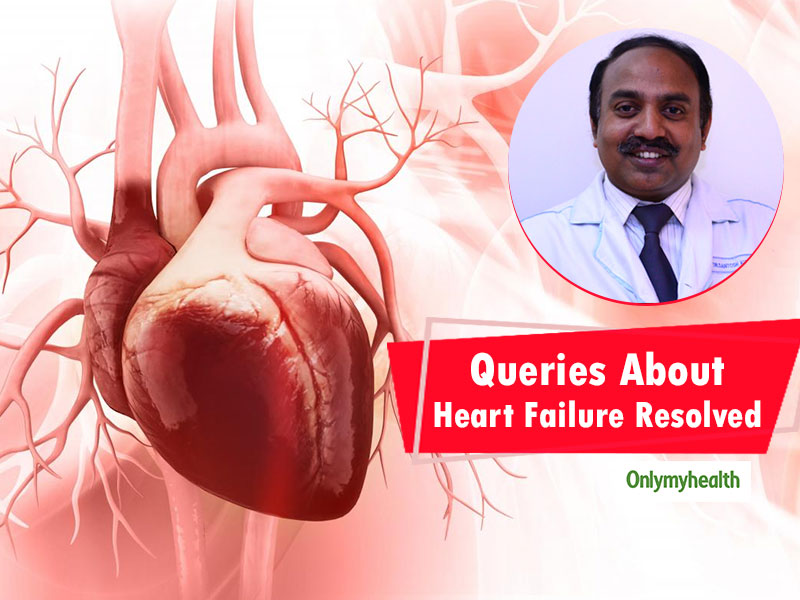
Heart failure is a chronic, progressive condition in which the heart muscle is unable to pump enough blood to meet the body’s needs for blood and oxygen. Dr Santosh Kumar Dora, Senior Cardiologist, Asian Heart Institute, Mumbai answers some critical questions asked by patients about this chronic condition.
Table of Content:-
Q - What Happens To The Body During Heart Failure?

A - Heart failure is a result of many cardiac disease process when the heart is unable to pump or receive blood as per the body’s requirement. Because of the pump failure, the fluid tends to get accumulated in the lungs and dependent parts of the body. When an excess of the fluid gets accumulated in the lungs, it leads to symptoms like dyspnea and cough. Initially, it is present during exertion, but as the condition worsens, it is present even at rest or lying down position. When the excess fluid gets accumulated at dependent parts of the body, it results in bilateral pedal edema.
Also Read: Ask Your Cardiologist These 5 Important Questions During Your First Visit
Q - What Is The Life Expectancy For Someone With Heart Failure?
A - Patients with heart failure have limited survival period. As per the statistics, 5-year survival is less than 50%. However, with proper care in diet, drugs and lifestyle modifications, often survival is prolonged. Complete correction of etiological factors of heart failure if any can give rise to normalcy in life span.
Q - What Are The Symptoms Of Heart Failure?

A - Symptoms of heart failure are dyspnea on exertion or rest, easy fatigability, bilateral ankle edema, weight gain and lack of appetite.
Q - What Are The Causes Of Heart Failure?
A - Causes of heart failure are many. The most frequent cause of heart failure is the decreased contractility of the heart due to damage to heart muscle following a heart attack. Sometimes there can be reduced contractility of the heart muscle not related to a heart attack also. This can be due to previous viral infection affecting the heart muscle, excess of consumption of alcohol, pregnancy-related cardiomyopathy etc. Damage to valves because of narrowing or leakage can lead to acute or chronic heart failure. Excessive blood volume as in anaemia, thyrotoxicosis also can lead to heart failure. Impaired relaxation of heart muscles in some situations like restrictive cardiomyopathy, constrictive pericarditis ( a condition due to thickened and calcific heart’s covering membrane) also can lead to heart failure.
Also Read: Consuming Calcium And Vitamin D Supplements Together May Increase Risk Of Stroke, Study Says
Q - Can Heart Failure Be Treated?
A - Heart failure can be treated in various ways. Immediate treatment is usually to get rid of the excess accumulated fluid in the body by giving drugs to increase urine output, decrease resistance to the heart’s pumping and improve contractility of the heart. Later on, the etiological factors leading to heart failure are corrected. Lifestyle modification, diet restrictions (mainly salt and water restriction) help a lot in improvement in heart failure condition. Specialised procedures like cardiac resynchronization therapy, radiofrequency ablation to correct the arrhythmia, corrective valve surgeries etc. can be done to treat the heart failure as and when required.
Q - Treatment Options for Heart Failure?

A - Treatment options of heart failure comprise of drug therapy, diet modification, lifestyle modifications, corrective heart procedure of any structural heart problems, pacemaker implantation where indicated etc. In some cases, when the heart muscles are irreversibly damaged, heart transplantation or ventricular assist devices can be implanted to treat heart failure.
Q - Can I Prevent Heart Failure?
A - Prevention is better than cure. Periodic health check-up can identify the heart problem at a very early stage so that measures can be taken to prevent further worsening of the cardiac condition. A healthy lifestyle like proper food habit, regular physical exercise, no smoking etc. go a long way to prevent heart disease and thus heart failure.
Read more articles on Heart Health
How we keep this article up to date:
We work with experts and keep a close eye on the latest in health and wellness. Whenever there is a new research or helpful information, we update our articles with accurate and useful advice.
Current Version